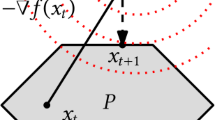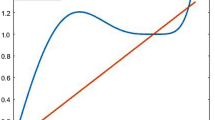Abstract
The problem of multivariate exponential analysis or sparse interpolation has received a lot of attention, especially with respect to the number of samples required to solve it unambiguously. In this paper we show how to bring the number of samples down to the absolute minimum of (d + 1)n where d is the dimension of the problem and n is the number of exponential terms. To this end we present a fundamentally different approach for the multivariate problem statement. We combine a one-dimensional exponential analysis method such as ESPRIT, MUSIC, the matrix pencil or any Prony-like method, with some linear systems of equations because the multivariate exponents are inner products and thus linear expressions in the parameters.
Similar content being viewed by others
References
Baker, G., Graves-Morris, P.: Padé Approximants Part I: Basic Theory Encyclopedia of Mathematics and its Applications, vol. 13. Addison Wesley, London (1981)
Ben-Or, M., Tiwari, P.: A deterministic algorithm for sparse multivariate polynomial interpolation. In: STOC ’88: Proceedings of the Twentieth Annual ACM Symposium on Theory of Computing, pp. 301–309. ACM, New York (1988)
Cuyt, A., Lee, W.-s.: Smart data sampling and data reconstruction. Patent US 61/611,899
Cuyt, A., Lee, W.-s.: Smart data sampling and data reconstruction. Patent PCT/EP2012/066204
Cuyt, A., Lee, W.-s.: Sparse interpolation and rational approximation. Contemp. Math. 661, 229–242 (2016). American Mathematical Society
Diederichs, B., Iske, A.: Parameter estimation for bivariate exponential sums. In: IEEE International Conference Sampling Theory and Applications (SampTA2015), pp. 493–497 (2015)
Henrici, P.: Applied and Computational Complex Analysis I. Wiley, New York (1974)
Hildebrand, F.: Introduction to Numerical Analysis. McGraw-Hill, New York (1956)
Hua, Y.: Estimating two-dimensional frequencies by matrix enhancement and matrix pencil. IEEE Trans. Signal Process. 40(9), 2267–2280 (1992)
Hua, Y., Sarkar, T.K.: Matrix pencil method for estimating parameters of exponentially damped/undamped sinusoids in noise. IEEE Trans. Acoust. Speech Signal Process. 38(5), 814–824 (1990)
Kaltofen, E., Lee, W.-s.: Early termination in sparse interpolation algorithms. J. Symb. Comput. 36(3-4), 365–400 (2003)
Kunis, S., Peter, T., Römer, T., von der Ohe, U.: A multivariate generalization of Prony’s method. Linear Algebra Appl. 490, 31–47 (2016)
Li, Y., Razavilar, J., Liu, K.J.R.: A high-resolution technique for multidimensional NMR spectroscopy. IEEE Trans. Biomed. Eng. 45(1), 78–86 (1998)
Mandelshtam, V.A.: The multidimensional filter diagonalization method: I. Theory and numerical implementation. J. Magn. Reson. 144(2), 343–356 (2000)
Nyquist, H.: Certain topics in telegraph transmission theory. Trans. Am. Inst. Electr. Eng. 47(2), 617–644 (1928)
Peter, T., Plonka, G., Schaback, R.: Reconstruction of multivariate signals via Prony’s method. Proc. Appl. Math. Mech. to appear
Plonka, G., Wischerhoff, M.: How many Fourier samples are needed for real function reconstruction? J. Appl. Math. Comput. 42(1-2), 117–137 (2013)
Potts, D., Tasche, M.: Parameter estimation for multivariate exponential sums. Electron. Trans. Numer. Anal. 40, 204–224 (2013)
Rouquette, S., Najim, M.: Estimation of frequencies and damping factors by two-dimensional ESPRIT type methods. IEEE Trans. Signal Process. 49(1), 237–245 (2001)
Roy, R., Kailath, T.: ESPRIT-Estimation of signal parameters via rotational invariance techniques. IEEE Trans. Acoust. Speech Signal Process. 37(7), 984–995 (1989)
Sauer, T.: Prony’s method in several variables: symbolic solutions by universal interpolation. J. Symb. Comput. 84, 95–112 (2018)
Sauer, T.: Prony’s method in several variables. Numer. Math. 136(2), 411–438 (2017)
Schmidt, R.: Multiple emitter location and signal parameter estimation. IEEE Trans. Antennas Propag. 34(3), 276–280 (1986)
Shannon, C.E.: Communication in the presence of noise. Proc. Inst. Radio Eng. 37(1), 10–21 (1949)
Shukla, P., Dragotti, P.L.: Sampling schemes for multidimensional signals with finite rate of innovation. IEEE Trans. Signal Process. 55(7), 3670–3686 (2007)
Wischerhoff, M., Plonka, G.: Reconstruction of polygonal shapes from sparse Fourier samples. J. Comput. Appl. Math. 297, 117–131 (2016)
Yilmazer, N., Fernandez-Recio, R., Sarkar, T.K.: Matrix pencil method for simultaneously estimating azimuth and elevation angles of arrival along with the frequency of the incoming signals. Digital Signal Process. 16(6), 796–816 (2006)
Zippel, R.: Probabilistic Algorithms for Sparse Polynomials. Ph.D. Thesis, Massachusetts Institute of Technology (1979)
Acknowledgements
This work was partially supported by a Research Grant of the FWO-Flanders (Flemish Science Foundation).
Author information
Authors and Affiliations
Corresponding author
Additional information
Communicated by: Yuesheng Xu
Rights and permissions
About this article
Cite this article
Cuyt, A., Lee, Ws. Multivariate exponential analysis from the minimal number of samples. Adv Comput Math 44, 987–1002 (2018). https://doi.org/10.1007/s10444-017-9570-8
Received:
Accepted:
Published:
Issue Date:
DOI: https://doi.org/10.1007/s10444-017-9570-8




